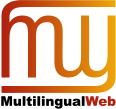Monthly Archives: December 2014
Posts
W3C MultilingualWeb Workshop Announced: 29 April 2015, Riga, Latvia

W3C announced today the 8th MultilingualWeb workshop in a series of events exploring the mechanisms and processes needed to ensure that the World Wide Web lives up to its potential around the world and across barriers of language and culture.
This workshop will be held 29 April 2015 in Riga, Latvia, and is made possible by the generous support of the LIDER project. The workshop is part of the Riga Summit 2015 on the Multilingual Digital Single Market (27-29 April)
Anyone may attend all sessions at no charge and the W3C welcomes participation by both speakers and non-speaking attendees. Early registration is encouraged due to limited space.
Building on the success of seven highly regarded previous workshops, this workshop will emphasize new technology developments that lead to new opportunities for the Multilingual Web. The workshop brings together participants interested in the best practices and standards needed to help content creators, localizers, language tools developers, and others meet the challenges of the multilingual Web. It provides further opportunities for networking across communities. We are particularly interested in speakers who can demonstrate novel solutions for reaching out to a global, multilingual audience.
See the Call for Participation and register online.
First Public Working Draft of Indic Layout Requirements published
The W3C Internationalization Working Group has published a First Public Working Draft of Indic Layout Requirements on behalf of the Indic Layout Task Force, part of the W3C Internationalization Interest Group.
This document describes the basic requirements for Indic script layout and text support on the Web and in eBooks. These requirements provide information for Web technologies such as CSS, HTML and SVG about how to support users of Indic scripts. The current document focuses on Devanagari, but there are plans to widen the scope to encompass additional Indian scripts as time goes on.
Publication as a First Public Working Draft, signals the beginning of the process, rather than an end point. We are now looking for comments on the document. Please send any comments you have to public-i18n-indic@w3.org. The archive is public, but you need to subscribe to post to it.
Recent translations into Simplified Chinese
修改 HTML 页面编码为 UTF-8 (Changing an HTML page encoding to UTF-8)
为什么使用语言属性? (Why use the language attribute?)
These articles were translated into Simplified Chinese thanks to Sam Chen.
Recent translations into German
Verwendung von Auswahllisten (select) für sprachspezifische und regionalspezifische Inhalte (Using select to link to localized content)
Visuelle vs. logische Buchstabenreihenfolge (Visual vs. logical ordering of text)
Angabe der Sprache in HTML (Declaring language in HTML)
Verwendung des translate-Attributs in HTML (Using HTML’s translate attribute)
These articles were translated into German thanks to Gunnar Bittersmann.
Final report for Chinese Layout Requirements Workshop available
The final report for the Workshop on Chinese Language Text Layout Requirements, which was held on September 11, 2014, at Beihang University, is now available. See also the Chinese version of this report.
The report contains links to slides.
The workshop gave a strong message of support for W3C Beihang and CESI to cooperate and lead the work on the Chinese Layout Requirement Document. In addition to Simplified and Traditional Chinese, there was also strong interest from representatives of the Mongolian, Tibetan and Uighur script communities to participate in the work. The closing session of the workshop proposed a number of steps to continue the efforts.
The W3C staff is driving the process of setting up this task force and reaching out to a wide range of interested stakeholders. This consultation will seek to clarify the mission for the task force, the target topics and industry priorities, and opportunities for liaisons with other related standards development organizations.
W3C® liability, trademark and permissive license rules apply.
Questions or comments? ishida@w3.org